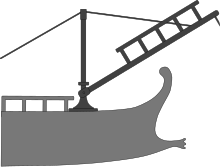Corvus (weapon)
A corvus (which in Latin means raven , but also means wall hook ) was a Roman boarding bridge that was used in naval warfare in the First Punic War against Carthage .
In the first book of his Roman history ( Pragmateia ), Polybios describes the corvus as a bridge that was 1.2 meters wide and 10.9 meters long, with a narrow parapet on both sides. The device was probably used in the bow of the ship, where a system of cable pulls allowed the bridge to be raised and lowered. At the other end of the device, under the bridge, was a heavy spike shaped like a beak (hence the name) that was supposed to seize into the planking on the deck of the opposing ship when the corvus was lowered from the Roman side. The system created a solid connection between the ships and gave the legionnaires the opportunity to cross over to the opposing side.
In the 3rd century BC BC Rome was not a naval power and had little experience in maritime warfare. Indeed, prior to the First Punic War , the Roman Republic did not venture into campaigns outside the Italian peninsula. Her knowledge was perfectly focused on battles on land, her greatest asset being the discipline and courage of her soldiers. The corvus now allowed the Romans to use this superiority against the more efficient Carthaginian fleet. The tactic of using their potential at sea also worked. The Romans won the battles of Mylae , Sulci , Tindaris, and Ecnomus , largely due to the corvus tactics and the Carthaginians' inability to respond.
In addition to its advantages, the corvus also had serious disadvantages: modern replicas show that its use impaired the maneuverability of the ship, as it put a heavier weight on the bow. The Romans lost in the years 255 BC. BC and 249 BC Because of the instability caused by the corvus , entire fleets in bad weather. This was probably the reason that the device was no longer taken into account when the ships were built towards the end of the war. On the other hand, the Romans' naval tactics were now improved, the teams were more experienced, and the advantage of the corvus in battle over its disadvantages had disappeared. The corvus is no longer mentioned in the sources after the battle of Cape Ecnomus, and obviously the battle of the Aegatic Islands , which decided the First Punic War, was won without him.
literature
- Adrian Goldsworthy : The Fall of Carthage . Cassel, London 2003, ISBN 0-304-36642-0 .
Web links
- Jona Lendering: Corvus . In: Livius.org (English)
